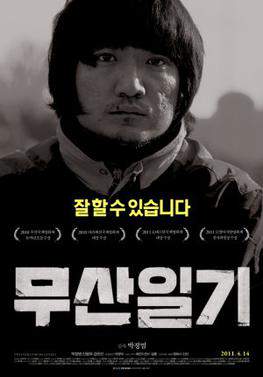The Journals of Musan 2011

In 2014, Ian Reynolds isolates himself in his parents' bathroom, desperately awaiting a cure for a devastating alien invasion caused by parasites. While in isolation, he begins to meticulously record his observations and personal reflections, hoping for news from his first love, who he fears may be affected by the crisis. He chronicles his experiences, clinging to hope amidst the unfolding global catastrophe.
Does The Journals of Musan have end credit scenes?
No!
The Journals of Musan does not have end credit scenes. You can leave when the credits roll.
Meet the Full Cast and Actors of The Journals of Musan
Explore the complete cast of The Journals of Musan, including both lead and supporting actors. Learn who plays each character, discover their past roles and achievements, and find out what makes this ensemble cast stand out in the world of film and television.
No actors found
External Links and Streaming Options
Discover where to watch The Journals of Musan online, including streaming platforms, rental options, and official sources. Compare reviews, ratings, and in-depth movie information across sites like IMDb, TMDb, Wikipedia or Rotten Tomatoes.
Ratings and Reviews for The Journals of Musan
See how The Journals of Musan is rated across major platforms like IMDb, Metacritic, and TMDb. Compare audience scores and critic reviews to understand where The Journals of Musan stands among top-rated movies in its genre.

56
Metascore
tbd
User Score


57%
TOMATOMETER

100%
User Score

67
%
User Score
Take the Ultimate The Journals of Musan Movie Quiz
Challenge your knowledge of The Journals of Musan with this fun and interactive movie quiz. Test yourself on key plot points, iconic characters, hidden details, and memorable moments to see how well you really know the film.
The Journals of Musan Quiz: Test your knowledge about the emotional journey of Seung-chul and his experiences as a North Korean defector in 'The Journals of Musan'.
What job does Seung-chul take up first in Seoul?
Pasting advertisements for adult entertainment
Working as a karaoke performer
Cooking in a restaurant
Construction worker
Show hint
Full Plot Summary and Ending Explained for The Journals of Musan
Read the complete plot summary of The Journals of Musan, including all major events, twists, and the full ending explained in detail. Explore key characters, themes, hidden meanings, and everything you need to understand the story from beginning to end.
The film’s intriguing tale focuses on Seung-chul, a silent and resilient refugee from North Korea, trying to navigate life in Seoul after escaping his home country. He shares an apartment with Kyung-chul, a crafty individual known as a “broker” who assists refugees in sending money back home. While they share harrowing backstories, their responses to adversity are starkly different. Seung-chul embodies timidity and subservience, bearing life’s trials and insults with remarkable stoicism. On the other hand, Kyung-chul lacks moral scruples, engaging in petty crimes and often pushing Seung-chul further into despair.
Seung-chul begins his arduous journey by accepting menial positions, notably pasting ads for adult entertainment venues in his vicinity. This job becomes increasingly perilous, as he faces frequent harassment from local thugs. In search of a more stable livelihood, he applies for several employment opportunities, but each time he presents his citizen registration number—a constant reminder of his North Korean roots—he faces rejection. Eventually, he manages to land a night shift at a karaoke bar where he encounters Young-sook, the owner’s daughter and a familiar face from his church. However, she insists on keeping her professional life separate from their personal interactions, aware that her job invites scorn from their shared congregation. Seung-chul agrees to keep this a secret, unaware that this decision will lead to significant challenges ahead.
In a later episode at the karaoke bar, the female staff overhears Seung-chul singing hymns, prompting them to offer him advice to enhance his vocal performance. However, the atmosphere shifts when Young-sook unexpectedly confronts him, furious over his choice of songs in the presence of women from the bar. Seung-chul explains that he lacks knowledge of popular South Korean music and avoids North Korean folk songs due to cultural sensitivities. Misunderstanding his explanation, Young-sook accuses him of deceit, resulting in her abruptly terminating his employment.
As Seung-chul finds himself amidst a solemn prayer meeting, accompanied by Detective Park, the shadows of his troubled past begin to emerge. Until this crucial moment, Seung-chul’s history remained largely hidden, with the numbers on his ID card hinting at his harrowing journey as a North Korean defector. With the innate pressure of his suppressed past now rising to the forefront, his story receives the attention it deserves.
Having grown up in the poverty-stricken North Hamgyong province, Seung-chul experienced childhood filled with acute malnutrition and unthinkable hardships. A seemingly innocent dispute overfood with a friend resulted in a life-altering tragedy when he learned of his friend’s tragic demise the following day, leaving Seung-chul enveloped in guilt and self-reproach. The heavy burden of his perceived guilt lingered until a pastor’s comforting words provided a flicker of solace.
Tragically, this moment of redemption is fleeting. Detective Park’s harsh rebuke as he leaves the prayer meeting shatters Seung-chul’s fragile peace. “Who would want to be friends with a killer?” he spat, plunging Seung-chul into tears of humiliation. The once downtrodden karaoke singer leaves, carrying the painful realization that his dark history forever stains his current existence.
In this vulnerable state, Young-sook, who had been present at the prayer session, approaches him with compassion in her eyes. She expresses regret for not knowing more about Seung-chul’s tumultuous background, offering to reinstate him at the karaoke bar and expressing her desire to forge a friendship with him. Though moved by her kindness, Seung-chul remains emotionally guarded, his feelings locked away beneath a sturdy facade.
Upon returning to his apartment, Seung-chul is faced with an unsettling revelation: his dear dog, Baek-gu, is missing. Kyung-chul’s callous attempt to sell the dog, only to abandon it later due to its mixed lineage, has left it vulnerable on the busy streets. In a desperate bid to reunite with his loyal friend, Seung-chul scours the neighborhood until he finds Baek-gu rummaging through a trash bag. Their touching reunion becomes a poignant testament to the loyalty that endures even in adverse conditions.
As night descends again, Kyung-chul’s genuine regret is evident when he pressurizes Seung-chul to help him retrieve a stash of “sincere” cash hidden in Baek-gu’s space. Though reluctant, Seung-chul concedes, emphasizing that their friendship is irreparably damaged and this will be his final act of goodwill. Unfortunately, upon entering his dwelling, Seung-chul is cornered by a gang of Kyung-chul’s associates demanding his whereabouts, insisting they need his cooperation for debt collection. Firm and unwavering, Seung-chul chooses silence over compliance.
The next day, he finds solace at church, where Young-sook graciously invites him to join her in the choir; an offer he reluctantly accepts. That evening, while performing his duties at the karaoke bar, Seung-chul leaves Baek-gu outside, deeming his home too dangerous due to Kyung-chul’s schemes. Tragically, in a brief moment of distraction, Seung-chul discovers his beloved dog’s lifeless body, cruelly struck down by an impatient driver on the road, cementing the harsh realities of his tumultuous journey.
Uncover the Details: Timeline, Characters, Themes, and Beyond!

Coming soon on iOS and Android
The Plot Explained Mobile App
From blockbusters to hidden gems — dive into movie stories anytime, anywhere. Save your favorites, discover plots faster, and never miss a twist again.
Sign up to be the first to know when we launch. Your email stays private — always.
Watch Trailers, Clips & Behind-the-Scenes for The Journals of Musan
Watch official trailers, exclusive clips, cast interviews, and behind-the-scenes footage from The Journals of Musan. Dive deeper into the making of the film, its standout moments, and key production insights.

Unlock the World of Movies with Our Comprehensive Wiki
Dive into our Movie Wiki for in-depth film encyclopedia entries, including cast biographies, production trivia, plot synopses, behind-the-scenes facts, and thematic analyses. Whether you’re researching iconic directors, exploring genre histories, or discovering hidden easter eggs, our expertly curated movie database has everything you need to fuel your cinematic passion.

Quick Links: Summary, Cast, Ratings, More

What's After the Movie?
Not sure whether to stay after the credits? Find out!
Explore Our Movie Platform
New Movie Releases (2026)
Famous Movie Actors
Top Film Production Studios
Movie Plot Summaries & Endings
Major Movie Awards & Winners
Best Concert Films & Music Documentaries
Movie Collections and Curated Lists
© 2026 What's After the Movie. All rights reserved.














